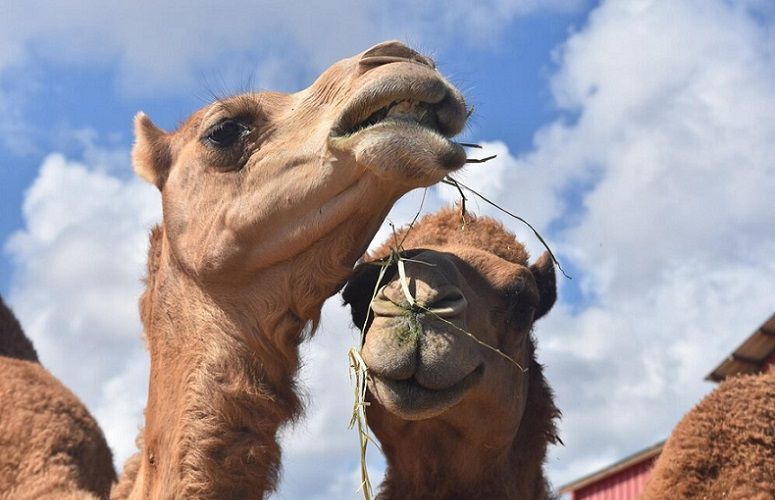Hunter Valley Farmer Leads NSW's Sole Camel Dairy Venture near Muswellbrook
In a surprising twist, the lush green paddocks of New South Wales' Hunter Valley have become home to more than 50 camels, marking a unique endeavor led by farmer Michelle Phillips on her 40-hectare property near Muswellbrook.

Phillips spearheads the state's solitary certified camel dairy, a journey that commenced over a decade ago driven by her fascination with the health benefits of camel milk. Initially inspired by the distant prospect of fresh camel milk only accessible via costly plane tickets to Western Australia's sole commercial dairy, Phillips embarked on a mission to make this nutritious resource more accessible to Australians.
The sparse landscape of certified camel dairies across Australia, numbering just seven, underscores the novelty of Phillips's initiative. Her motivation, however, transcends mere entrepreneurial zeal. Phillips, reflecting on Australia's burgeoning feral camel population and the consequential mass culling efforts, was stirred to action. While acknowledging the impossibility of rescuing all feral camels, she envisioned a sanctuary where some could find refuge.
The procurement of her initial batch of camels wasn't a straightforward affair. Journeying to Peterborough, South Australia, Phillips acquired a group of feral camels from a seasoned Aboriginal stockman. The endeavor posed multifaceted challenges, from taming and milking these wild creatures to fostering trust, a process that demanded months of dedication.
Despite the unconventional nature of her venture, Phillips's camel dairy swiftly garnered attention and demand, particularly from the Muslim community, drawn by the rich cultural heritage and purported health benefits associated with camel milk. Today, her herd of 50 camels, including calves, fulfills the needs of discerning consumers across Western Sydney, with a growing clientele clamoring for this unique product.
Camel milk, priced between $20 and $25 per liter, presents a distinctive alternative to traditional dairy products. While akin to cow's milk in many aspects, camel milk offers its own unique flavor profile, characterized by a subtle salty note and a thinner consistency reminiscent of skim milk. Nutritionists tout its virtues, citing its richness in protein, vitamins, and minerals, with some even proposing its suitability for individuals with lactose intolerance or cow milk allergies.
Phillips's pioneering venture not only enriches the dairy landscape but also highlights the potential of camel farming in diverse agricultural contexts, showcasing the adaptability and untapped potential of these remarkable animals beyond their traditional desert habitats.
The sparse landscape of certified camel dairies across Australia, numbering just seven, underscores the novelty of Phillips's initiative. Her motivation, however, transcends mere entrepreneurial zeal. Phillips, reflecting on Australia's burgeoning feral camel population and the consequential mass culling efforts, was stirred to action. While acknowledging the impossibility of rescuing all feral camels, she envisioned a sanctuary where some could find refuge.
The procurement of her initial batch of camels wasn't a straightforward affair. Journeying to Peterborough, South Australia, Phillips acquired a group of feral camels from a seasoned Aboriginal stockman. The endeavor posed multifaceted challenges, from taming and milking these wild creatures to fostering trust, a process that demanded months of dedication.
Despite the unconventional nature of her venture, Phillips's camel dairy swiftly garnered attention and demand, particularly from the Muslim community, drawn by the rich cultural heritage and purported health benefits associated with camel milk. Today, her herd of 50 camels, including calves, fulfills the needs of discerning consumers across Western Sydney, with a growing clientele clamoring for this unique product.
Camel milk, priced between $20 and $25 per liter, presents a distinctive alternative to traditional dairy products. While akin to cow's milk in many aspects, camel milk offers its own unique flavor profile, characterized by a subtle salty note and a thinner consistency reminiscent of skim milk. Nutritionists tout its virtues, citing its richness in protein, vitamins, and minerals, with some even proposing its suitability for individuals with lactose intolerance or cow milk allergies.
Phillips's pioneering venture not only enriches the dairy landscape but also highlights the potential of camel farming in diverse agricultural contexts, showcasing the adaptability and untapped potential of these remarkable animals beyond their traditional desert habitats.
Key News of the Week










